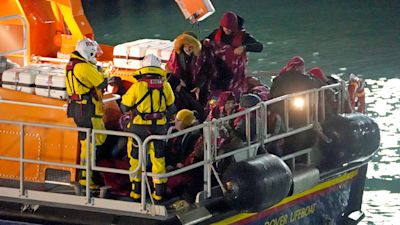Priti Patel urged to introduce 'humanitarian visas' to allow people to cross Channel safely

MPs from four opposition parties are calling on Priti Patel to issue “humanitarian visas” to allow people to cross the Channel safely if they can prove they have a good chance of being granted refugee status and a good reason to submit their application in the UK rather than France.
An amendment to the Nationality and Borders bill has been laid down by Labour’s Neil Coyle, who accused the Home Office of being “culpable in deaths in the Channel”.
“The government has created a situation where even allies of Britain, like Afghans who fought alongside us, have no legal means to enter the UK and feel boarding a dinghy is their only hope,” he said.
The amendment, which was drawn up by the charity Detention Action, is also supported by Tim Farron, from the Lib Dems, Joanna Cherry of the SNP and Caroline Lucas from the Green party.
ITV News understands that Conservative MPs are also considering trying to amend the legislation to make it easier for children who have relatives in Britain to make the journey safely.
The amendments will be to the Borders bill, which is making its way through Parliament.
It will criminalise asylum seekers who arrive in the UK via illegal routes giving them only temporary status under which they have limited rights – in an effort to persuade people to only attempt the journey via legal schemes.
It comes after the home secretary told parliament that she had offered France joint patrols and joint working to try to tackle the crisis after 27 people died, including a pregnant woman and three children.
Britain has pointed the finger of blame at France for the rising number of crossings, which have spiralled from less than 2,000 in 2019 to almost 26,000 already this year.
Boris Johnson said the efforts by French authorities to patrol the beaches, including using money supplied from Britain, “haven’t been enough”, saying there had been difficulty in persuading our neighbouring country “to do things in a way that we think the situation deserves”.
But when it comes to the blame game, others are pointing the finger back at the UK. Bella Sankey, director of Detention Action, said the “catastrophic situation represents years of government failure – spending vast sums of public money to displace refugee journeys making them harder and more dangerous”.
She called for a humanitarian visa to ensure “traumatised men, women and children can be brought to the UK safely while undermining the business model of the smuggling gangs".
Others – including Bethany Gardiner-Smith, chief executive of Safe Passage - argued that ministers have closed down alternative safe routes into Britain. In particular, she pointed to the so-called “Dubs scheme” that allowed unaccompanied children into the country, and a Syrian resettlement scheme. A new scheme for Afghanistan hasn’t been set up yet.
New figures released on Thursday show that in the year up to September 2021, only 1,171 people arrived in Britain as refugees via a resettlement scheme – down from 2,160 the year before.
“One of the reasons for this tragedy is the lack of any safe options for people – and as we have seen people who are desperate will still try to come. What is the next step – building a Trump-style wall? Where is this going to end?” said Gardiner Smith.
She accused ministers of “doubling down on the same old failed policies”, arguing that the borders bill would “do nothing” to prevent more boats coming. “It is silent on safe routes.”
In an equality impact assessment of the legislation, the government says its aim is to persuade asylum seekers to claim in the first safe country they arrive in, but admits “evidence supporting the effectiveness of this approach is limited”.
Moreover it concludes that the increased security and deterrence measures in the bill could encourage people to “attempt riskier means of entering the UK”.
Many experts feel the huge rise in boat crossings is a result of tighter security around the Eurotunnel, and more checks on lorries.
The government’s tough approach is in part a response to public mood, with several Conservative MPs, including in new red wall seats, saying this issue is being raised repeatedly by constituents.
Patel has also argued that last year 70% of those crossing were economic migrants.
The Refugee Council argues that figure cannot be correct. They point to the situations in the most common countries from which people crossing by boat come from including Iran, Iraq, Sudan, Syria and Afghanistan.
They say that 98% of people crossing will claim asylum.
Although they don’t have data on individual cases, they say that overall – from the top 10 countries of origin – around 61% of applications will be successful, and result in refugee status.